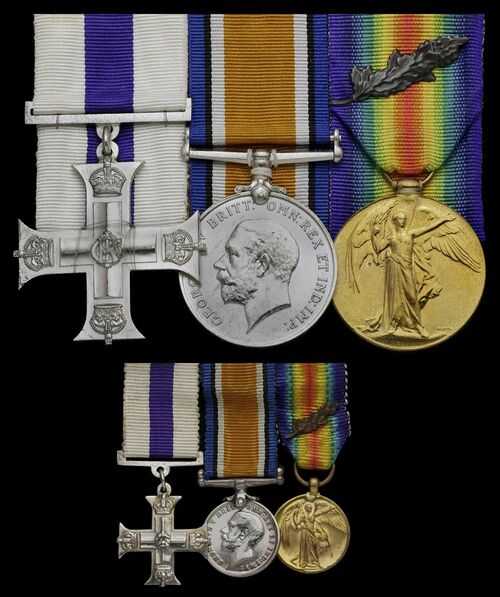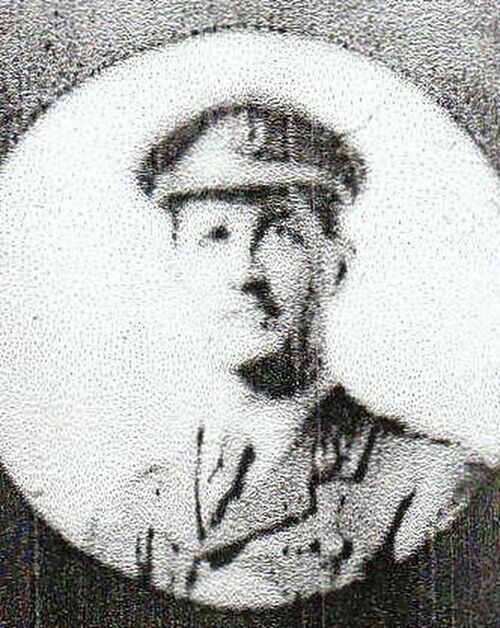Auction: 23001 - Orders, Decorations and Medals
Lot: 398
(x) 'There was H.A. Oxenham who looked after our Wireless work of the Sqn, and who, the day the 4th Army launched the Somme offensive (1st July), would actually succeed in borrowing a rifle and bayonet from the advanced battery he was legitimately visiting, and join one of our regiments on its way into the enemy's position.'
(Observer - Memoirs of the R.F.C. 1915-18 by A. J. Insall refers)
An Australian Wireless Operator's and Observer's 1916 M.C. group of three awarded to Major H. A. Oxenham, Royal Air Force, late Trooper, Transvaal Mounted Rifles, who left his job at a Wireless Station off Honolulu on the outbreak of war to join the Royal Flying Corps and served as the first Commandant at the Joint School, Brooklands
Oxenham even managed to charge with the Infantry on the First Day of the Somme in unlikely circumstances having 'borrowed' a rifle and bayonet for the task
Military Cross, G.V.R., the reverse contemporarily engraved 'Major H. A. Oxenham R.A.F. 1916'; British War and Victory Medals, with M.I.D. oak leaves (Major H. A. Oxenham. R.A.F.), mounted court-style for display by Spink & Son, St James's, London, very fine (3)
Herbert Anselm Oxenham was born at Warwick, Queensland, Australia on 7 April 1876. As his education developed he began to specialise in wireless operation, finding work as an Apprentice Operator with the Queensland Railway in 1892, having qualified as an Operator in his own right by 1895. Moving on to work as Assistant at the Rockampton Telegraph Office in 1898, Oxenham was in South Africa at the outbreak of the Second Anglo-Boer War. Here he enlisted with the Port Elizabeth Town Guard, later seeing service with the South African Light Horse and finally, in 1906, with the Transvaal Mounted Rifles (Medal and clasp). The Queenslander, 2 October 1915, takes up the story:
'He travelled as wireless operator for two years from the West Indies to England on the Oruba, and being skilled in wireless was appointed to a wireless station off Honolulu, which position he held with credit till lately, when he left for England, via New York, to offer his services to his country, and was given a commission as above.'
Commissioned Lieutenant on 1 July 1915 he entered the war in France that same month (1914-15 Star) with No. 3 Wing and saw action there very quickly: a letter published in a local newspaper under the title A Queensland Lieutenant gives us an insight into his work stating:
'Am off to the Front. Wife stayed behind in New York. It was pretty hard parting for both of us; however, we thought it best that I should come and do my share. Every man is needed if we are ever to lick these f----- swine, as they are usually called in England. We had a long tedious trip from Honolulu to New York, especially across Canada, owing to delays caused by the war, and an exciting time crossing to England dodging submarines. Everybody stayed up on all the last night with life belts on, in case of accidents.
After a week or so hunting around I got the offer of this job from the War Office, and think it will pan out all right when I get settled down to it, and somewhere near the Front. I am Lieutenant Wireless Equipment Officer, and have had quite a number of flights in the speedy aeroplanes, 6000ft or 7000ft up. I was a bit shaky on it the first time, but don't mind a bit now. My work doesn't call for flying but I have to go up occasionally, so may as well get used to it. Hope Leo is on the mend; the fighting is pretty hot in the Dardanelles. Only for this war I would have managed a trip home in a few months. Still, no use grumbling. I felt it was my duty to enlist, and put my little bit towards it. Have any of our young friends gone to the Front, or are they all hanging back, letting someone else fight for them?'
His enthusiasm for action led him into combat on the First Day of the Somme and earned him a 'mention' not long later (London Gazette 15 June 1916). After his time on the front, Oxenham was promoted Captain and posted to the Wireless and Observers School as Commandant (graded as 'Park Commander') on 3 October 1916. He served in this role until 29 April 1917 when he was transferred to the role of Assistant Commander with the rank of Acting-Major. He managed to wrangle himself a place on an official visit to Canada before a posting to H.Q. Ft. Div on 4 January 1918, before transferring to the Training Division on 20 April 1918.
With his promotion to Major confirmed on 19 November 1919 Oxenham was posted to H.Q. Middle East that July but soon returned to Britain for discharge, on 3 September 1919. He applied for his campaign medals whilst living in San Mateo, California in 1924 and became a naturalised citizen of the United States of America in Hawaii on 29 August 1925. Oxenham died at Bay Street, Louis Hancock County, Mississippi on 16 August 1957; sold together with corresponding miniature dress medals and a quantity of copied research including newspaper cuttings, passenger manifests, medal rolls and army lists as well as census data and extracts from the London Gazette and Observer - Memoirs of the R.F.C. 1915-18.
Subject to 5% tax on Hammer Price in addition to 20% VAT on Buyer’s Premium.
Sold for
£1,000
Starting price
£800







